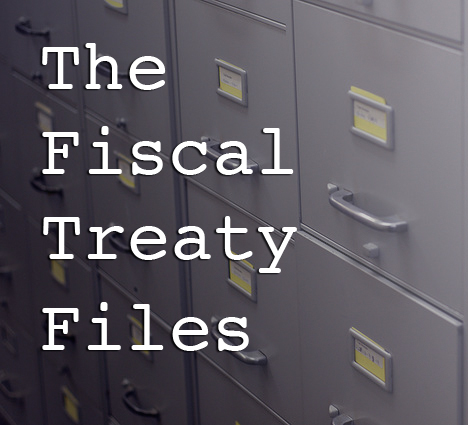Stephen Collins is wrong…again

Stephen Collins's arguments for a 'yes' vote in the Fiscal Treaty are deeply flawed. By Eoin Ó Broin.
Stephen Collins is at it again. His latest Irish Times column on the Fiscal Treaty (10 March 2012) displays a disregard for the facts.
The column makes four key arguments. Let’s take them in turn.
Collins warns against the arresting but “baseless” slogans of no campaigners in EU referenda. He claims that opponents of the Fiscal Treaty have adopted the mantra that the treaty will outlaw Keynesian economics.
The first economist to claim that the Fiscal Treaty will outlaw Keynesian economics was Paul Sweeney, speaking to an Oireachtas European Union affairs committee on 23 February 2012.
Sweeney is the chief economist to the Irish Congress of Trade Unions. He is also a strong supporter of European Integration. During the Lisbon campaign Sweeney was vocal in his support of that Treaty.
Speaking to the Oireachtas European Affairs committee in February of this year he said that; “The treaty is an attempt to outlaw Keynesian economics and stop any fiscal stimulus as a counter to recession. The Union will be outlawing interventionist economics.”
Interestingly the same Oireachtas committee heard University College Cork economist Seamus Coffee respond to Paul Sweeney’s claim. Seamus told the assembled Oireachtas members that while, “…the claim that [the treaty] outlaws Keynesianism is technically not true. It may be true in practice.”
Now, economists will continue to debate this point for some time. But the claim that the Fiscal Treaty will make it more difficult if not impossible to employ Keynesian style economic stimulus is not baseless, nor is it one exclusively articulated by those of us traditionally critical of European Integration.
In an attempt to emphasise his point Collins argues that if the Fiscal Treaty sought to outlaw Keynesian economics Social Democratic parties across Europe would be “opposing it tooth and nail”.
To the contrary, we are told, the Swedish government were one of the first administrations to sign up to the Treaty.
Of course, Sweden is currently governed by a centre-right coalition led by the Moderate Party, so its support for the Fiscal Treaty is hardly surprising.
Meanwhile social democratic parties are opposed to the Treaty and actively seeking changes to it.
Both the French and German social democratic parties have indicated that their support for the Treaty is conditional on securing changes aimed at promoting investment in job creation.
Notwithstanding this, mainstream European social democratic parties abandoned Keynesian economics some twenty years ago, so the strength of their opposition to the Fiscal Treaty should not be taken too literally.
However, the last great bastion of European social democracy is the European Trade Union Confederation. Their opposition to the Treaty is clear and forthright.
Bernadette Ségol, the ETUC’s General Secretary said on 12 January 2012 that the Treaty, “reinforces policies that do not work and fails to take up today’s challenges. Fiscal does not work. We know this. It is clear from the effects of austerity measures on Greece that this is not the right way forward. The objective seems to be to impose even stricter austerity measures without offering any prospects for growth. The European Trade Union Confederation condemns this approach. Fiscal discipline alone, in the absence of recovery and investment measures, is dragging countries into crisis.”
So European social democrats are opposing the Fiscal Treaty.
Having demonstrated his lack of knowledge about the politics of European social democracy, Collins changes tack and tries to impress us with his knowledge of the Irish economy.
He claims that the purpose of the Treaty is “to put an end to the kind of populist and inept fiscal policies that brought Ireland to the brink of ruin.”
This is a very important claim and one that deserves some close inspection.
Stephen Collins is claiming that the Fiscal Treaty would put an end to the type of Government decisions that led to our economic crash in 2008.
The Treaty seeks to impose stricter compliance with the existing Stability and Growth pact rules, namely the debt-to-GDP ratio of 60% and the general government deficit ceiling of 3%. It also seeks to strengthen the new structural deficit rule of 0.5% agreed by the European Council and Parliament at the end of 2011.
Now, Collins is claiming that if the new enforcement mechanisms for the 3% deficit and 60% debt rules and the new 0.5% structural deficit rules had been in place prior to 2008 things in Ireland would have been different.
Unfortunately, for Collins, the facts tell a different story. In 2007 the general Government balance was 0.3%, the structural balance was 2.3% and our debt-to-GDP ratio was 24.8%. In short we were completely compliant with the various components of the Fiscal Treaty. Indeed on all three measures we were far from the danger zone.
Nothing in the Fiscal Treaty would have compelled the then Government to take different fiscal policy decisions.
When asked about this during the Oireachtas European Affairs committee meeting in February of this year University College Cork economist Seamus Coffey said, “Had the fiscal compact been in place since 1999 it could not and would not have prevented the crisis in Ireland because we would have satisfied the structural deficit and debt break rule during the last five or six years prior to the crisis. As such, it would not have helped us in terms of avoiding the crisis.”
An economist closer to Stephen Collin’s own ideological world view, Colm McCarthy agreed with Coffey. Writing in the Sunday Independent on 5 February 2012 the UCD economist asked: “If the new treaty had been in place since the euro's launch in 1999, would it have prevented the crisis?” McCarthy went on to answer his own question with a resounding, “No: only in the case of Greece, where there was real fiscal misconduct, might the treaty's provisions have made a difference.”
Having so far failed to convince the reader with his arguments, Collins tries to scare undecided voters with claims that the country will go bankrupt if we reject the Treaty.
This claim is a serious and one I will return to at more length soon. But in considering whether the European Council would refuse emergency funding to a Eurozone member state frozen out of the markets it is important to keep two things in mind.
Firstly the impact of doing so would be seriously destabilising for the Eurozone as a whole, something no European political leader would risk.
Secondly the European Council in June 2011 said it would, “continue to provide support to countries under programmes until they have regained market access, provided they successfully implement those programmes.”
There is little doubt that the “no-ratification no-bailout funds” argument is being used to bully people into supporting the Treaty. Given their difficulty in presenting positive arguments for supporting the Treaty it is hardly surprising that the Government and media cheerleaders such as Stephen Collins have to resort to threats to get people to vote yes. {jathumbnailoff}
 This article is part of our Fiscal Treaty Files series. For more of our coverage of the Fiscal Treaty click here.
This article is part of our Fiscal Treaty Files series. For more of our coverage of the Fiscal Treaty click here.
Image top (Bernadette Ségol): Suomen Ammattiliittojen Keskusjärjestö SAK
